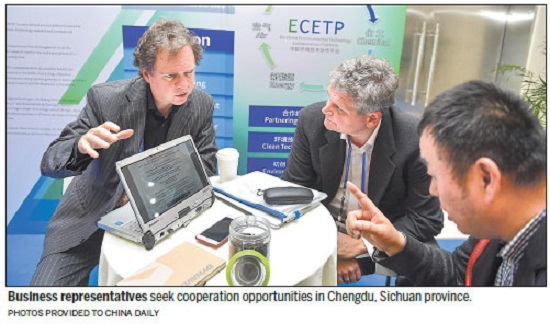High-tech zone hums with purpose
Chengdu, the megacity in southwestern China, has witnessed its region's emergence on China's economic landscape over the past four decades in the wake of the country's reform and opening-up.
The Chengdu Hi-tech Industrial Development Zone, a key driver of the local economy's growth, is the epitome of the metropolis' transformation from a lesser known inland city to a financial pathfinder with an open economy that is increasingly capturing the attention of global investors.
Of the top 100 outstanding private entrepreneurs in Sichuan, 10 are from the Chengdu high-tech zone. Nine companies based in the zone are on the list of the top 100 excellent private businesses.
Officials say the zone is accelerating the pace of its reform and opening-up to seek more development momentum.
The zone's administrative committee was to release new favorable policies on Thursday to further support business incubation.
Back in 1991, after three years of preparation, the founding of the national-level high-tech zone got the green light, just as its coastal peers were riding high on the country's opening-up policies.
A Singaporean-funded industrial park was relocated from the city's Wuhou district to the high-tech zone in 1996, giving the latter the first experience of international cooperation and opening a new chapter in the joint building of cooperative parks with other countries.
In 2001, China joined the World Trade Organization. Against the backdrop, the Chengdu high-tech zone sought more opportunities for international cooperation and competition at higher levels and in more fields.
The zone joined the ranks of tech industrial parks that the Chinese government approved to be opened to members of the Asia-Pacific Economic Cooperation organization in 2000.
A year later, it gained International Organization for Standardization 14001 certification for environmental management in China and was also recognized by the United Kingdom Accreditation Service
Officials say Chengdu's investment-friendly climate and unique geographical advantages have put the city's opening-up on the fast track.
The agreement on Singapore-Sichuan Hi-Tech Innovation Park, the first integrated urban development project funded by the two parties, was signed in 2010 for it to be located at the Chengdu hightech zone.
Its construction began in 2012 and is scheduled to be completed in 2020. To date, it has attracted 34 investment projects worth combined 33.9 billion yuan ($4.88 billion).
The Sino-Korea Innovation and Startup Park in the zone has attracted Korea Investment Partners, the largest venture capital firm in South Korea, as well as other Korean businesses.
Sophia Antipolis, dubbed as the French version of Silicon Valley, has signed an agreement with the Chengdu zone to establish sister-park relations, and Startupbootcamp, a global group of industry-focused startup accelerators, has also settled in the zone.
The Business and Innovation Center for China-Europe Cooperation went into operation in the zone during the 2017 Chengdu Global Innovation and Entrepreneurship Fair, adding a new opening-up platform to the city. Its 192-meter-high tower, finished in a Nordic design style, serves as a pivot to promote exchanges between China and Europe.
The center also works to promote economic development of the European Union members, as well as cooperation in culture, education and arts.
Since its inauguration in May last year, it has received more than 500 visits by government officials from 25 countries involved in the Belt and Road Initiative, including representatives of the European Parliament and the ambassadors of Italy, Finland, Austria, France and Germany.
The Chengdu high-tech zone is also a favorite investment destination for Fortune 500 companies, officials said.
The big names in the zone include German electronics manufacturer Siemens, Japanese home appliance manufacturer Hitachi, information technology leaders Intel, Dell and Lenovo, and pharma giants Bayer, Medtronic and Sanofi.
To date, 119 Fortune 500 companies have made a home in the zone, covering a variety of sectors such as electronics information, biopharmaceuticals, finance, manufacturing, retail, aviation and energy.
A section of the high-tech zone has been included into the China (Sichuan) Pilot Free Trade Zone, which was unveiled in April last year.
Capitalizing on the free trade zone's favorable policies, the high-tech zone is leveraging global industrial, financial and innovation resources to further its opening-up and growth.

Invest in China Copyright © 2026 China Daily All rights Reserved
京ICP备13028878号-6
 京公网安备 11010502032503号
京公网安备 11010502032503号





